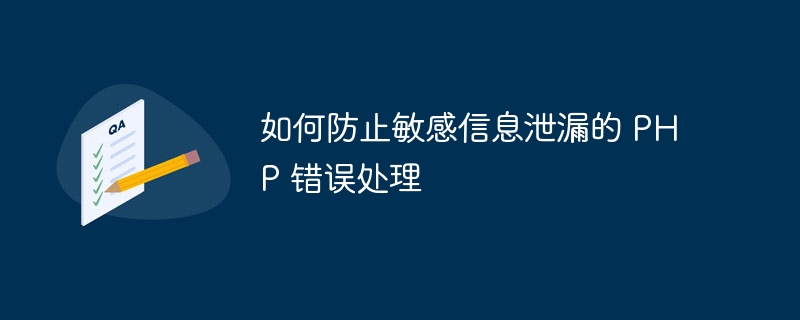Home >Backend Development >PHP Tutorial >How to prevent sensitive information leakage with PHP error handling
How to prevent sensitive information leakage with PHP error handling
- 王林Original
- 2023-08-07 15:48:18893browse

How to prevent sensitive information leakage in PHP error handling
During development, an experienced PHP developer will encounter error handling problems. Proper handling of errors is a good programming practice that can make our applications more stable and secure. However, improper error handling can lead to the leakage of sensitive information, which can cause significant damage to our applications and users. Therefore, we need to pay special attention to PHP error handling on how to prevent the leakage of sensitive information during the development process.
A common way sensitive information is leaked is through displaying incorrect details. When an error occurs in PHP, by default, the error message will be output directly to the page, so that even ordinary debugging information may be used by attackers to find vulnerabilities and attack our applications. Therefore, we need to record the error information to the log file and return a friendly error page to the user.
The following is an example error handling class to prevent the leakage of sensitive information:
class ErrorHandler {
public function handle($errorNumber, $errorMessage, $errorFile, $errorLine) {
// 将错误信息记录到日志文件
$this->logError($errorMessage, $errorFile, $errorLine);
// 返回给用户一个友好的错误页面
$this->displayErrorPage();
}
private function logError($errorMessage, $errorFile, $errorLine) {
// 将错误信息记录到日志文件中,可使用不同的日志库或方法
// 这里仅作示例,使用了简单的写文件方法
file_put_contents('error.log', "[" . date('Y-m-d H:i:s') . "] Error: $errorMessage in $errorFile on line $errorLine" . PHP_EOL, FILE_APPEND);
}
private function displayErrorPage() {
// 返回给用户一个友好的错误页面
// 可以在此处显示自定义的错误信息页面或跳转到特定的错误处理页面
echo "Oops! Something went wrong. Please try again later.";
exit;
}
}
// 设置错误处理函数
$errorHandler = new ErrorHandler();
set_error_handler([$errorHandler, 'handle']);In the above example, we first define an ErrorHandler class, where There is a handle method for handling PHP errors. In this method, we record the error information to the log file and return a friendly error page to the user. Recording error information into a log file facilitates problem tracking and error analysis. Returning a friendly error page to the user can effectively protect the security of sensitive information.
Next, we use the set_error_handler function to set the error handling function to our custom error handling function. In this way, when an error occurs in PHP, the error handling function we defined will be called to handle the error.
Using this error handling class, even if an error occurs, the user will only see a friendly error page and will not see any sensitive information. At the same time, error information will be recorded in the log file for subsequent analysis and repair.
To summarize, in order to prevent sensitive information from being leaked in PHP error handling, we should log error information to a log file and return a friendly error page to the user. This makes it easy to track issues and fix bugs while protecting users.
Through the above method, we can ensure that our application will not leak sensitive information when an error occurs, improving the security and reliability of the application. Of course, in actual applications, further security measures and error handling optimization can be carried out according to specific needs and situations.
The above is the detailed content of How to prevent sensitive information leakage with PHP error handling. For more information, please follow other related articles on the PHP Chinese website!

